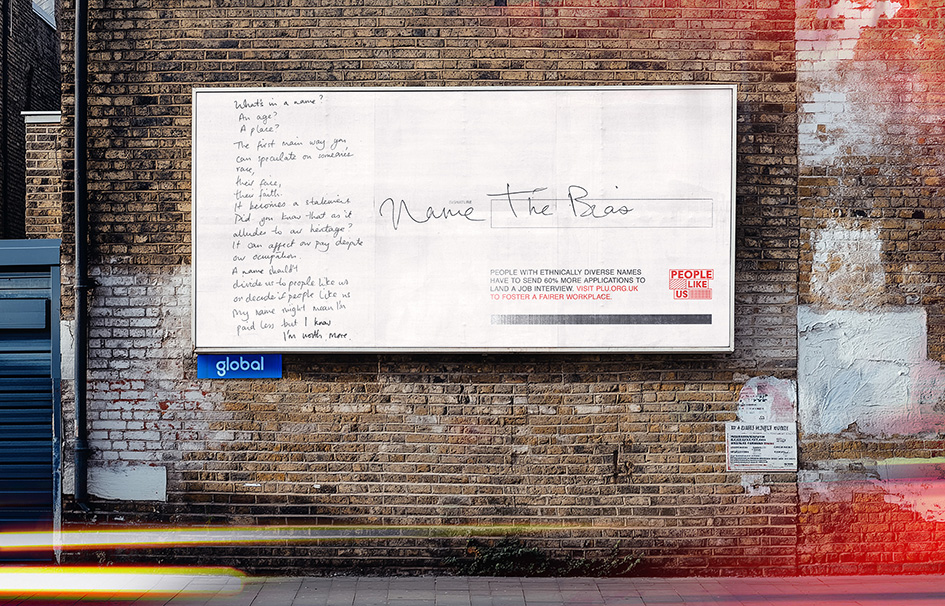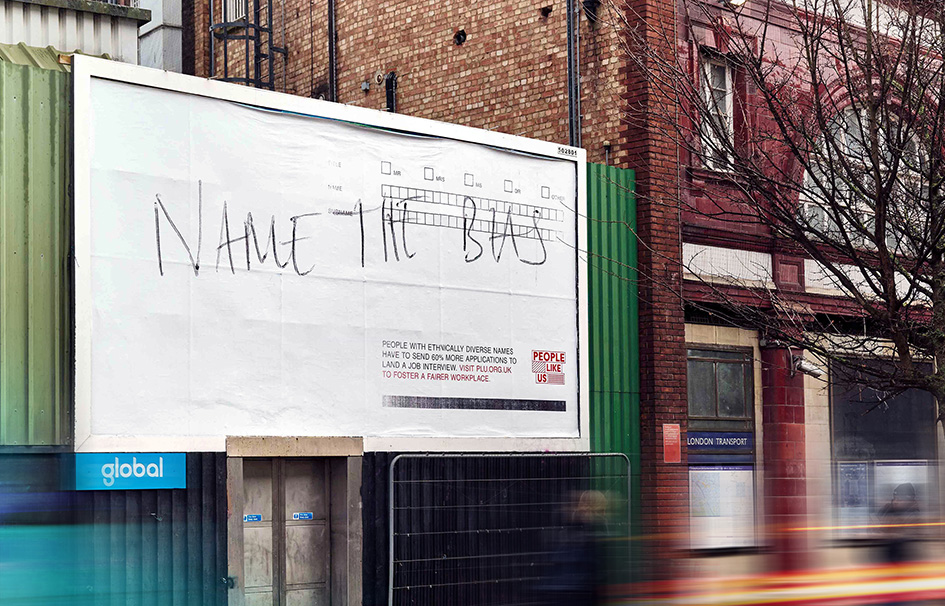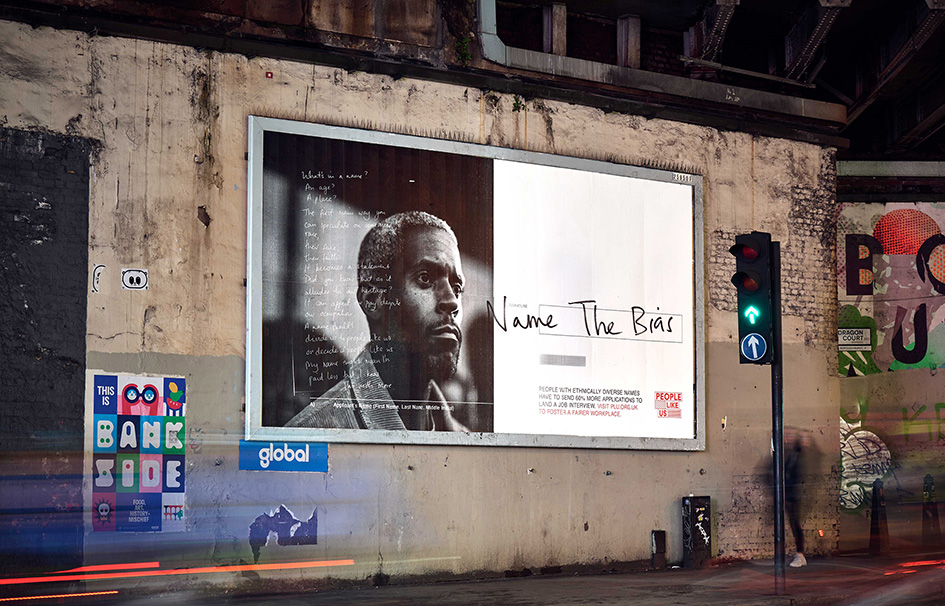Bias starts with a name says People Like Us in campaign via creative agency Worth Your While highlighting ethnicity pay gap in the UK
Does what you’re called actually matter? Yes, says a powerful new campaign for UK workplace equality champions People Like Us, spotlighting the stark inequities in pay, workplace treatment, and job prospects linked to ethnically diverse names. Created by Copenhagen independent creative studio Worth Your While (creative director and partner is Aussie expat Tim Pashen), #NameTheBias exposes how hidden “name bias” in UK hiring practices impacts ethnic minorities’ earning potential before they even set foot in an interview, and is pushing for urgent government action on ethnicity pay gap reporting.
Launched yesterday on Ethnicity Pay Gap Day (8 January 2025) – alongside a new survey by People Like Us and Censuswide – which shows alarming disparities in workplace treatment and pay transparency between white and ethnic minority workers in the UK – the campaign draws on research from the University of Oxford revealing that candidates with ethnic-minority names must submit 60% more job applications to secure a callback compared to white British applicants.
With disparities unchanged since the 1960s, #NameTheBias aims to spark national conversation, educate policymakers, and push for a timeline for the introduction of mandatory ethnicity pay gap reporting to address systemic inequalities in the workplace.
The centrepiece of the multimedia campaign is a two-minute film, directed by award-winning filmmaker Naghmeh Pour through new—land, which poses the question: do names matter? Shakespeare may not have thought so when he penned the lines – “What’s in a name? That which we call a rose by any other name would smell just as sweet” in Romeo & Juliet – but the film shows us otherwise, as British Bangladeshi lyricist, Yasmin Ali, subverts the Bard’s age-old question with a bespoke spoken word piece.
Starkly shot in black-and-white, the film captures a group of ethnic minority workers waiting at a bus stop while Ali lyrically describes the ripple effects of having the ‘wrong’ name on employment prospects and career progression. When the bus finally arrives, white commuters board first, the doors closing in their ethnic counterparts’ faces as a vivid visual metaphor.
Drawing on her own minority ethnic background, Ali’s performance brings a blistering authenticity and emotional depth to the film, which concludes with the line: “My name might mean I’m paid less / But I know I’m worth more” – underlining the campaign’s call for urgent systemic reform.
Bringing the cause to the heart of the government, the film is set to be screened at events at both the House of Lords and Houses of Parliament on 8th January, alongside a live poetry performance by Ali.
Accompanying the brand film, which will be showcased online, across social platforms, and key digital media placements, the multimedia campaign will be backed by social influencer activation within the spoken word community and People Like Us network. Additional elements include striking OOH billboards across London highlighting the impact of racial name bias in hiring, which take inspiration from design elements of a job application form and feature hand-written excerpts of the poem from Ali’s notebook. Expert guidance for individuals on handling salary conversations and for businesses on creating equitable workplace practices will also be available on the People Like Us website.



#NameTheBias is the latest instalment of work created in People Like Us’ long-running partnership with independent creative studio Worth Your While, with previous campaigns including Signatures for Signatures and the Autocorrected Pay Gap.
Having spent over five years dismantling barriers for ethnically diverse professionals, the efforts of People Like Us – together with a breadth of forward-thinking organisations and businesses – were rewarded by ethnicity pay gap reporting being included in a draft bill in the King’s Speech in July 2024.
However, systemic inequities still persist, as key findings from the new survey by People Like Us and Censuswide show: ethnic minority workers face greater barriers to discussing pay, disproportionately experience negative repercussions, and feel the impact of a lack of representation in leadership roles.
In seeking to spark a national conversation, the new campaign aligns with the organisation’s advocacy for mandatory ethnicity pay gap reporting, a critical step toward addressing structural inequalities in UK workplaces. Beyond this, it also addresses two of the UN’s Sustainable Development Goals: promoting sustained, inclusive economic growth, full productive employment, decent work for all; and reducing inequality within and among countries.
Says Sheeraz Gulsher, Co-Founder of People Like Us: “This campaign exposes how name bias quietly contributes to unequal pay and career stagnation for millions of workers. By sparking awareness and offering practical tools, we aim to empower individuals and push businesses and policymakers toward meaningful change.”
Says Yasmin Ali, spoken word artist: “When people are judged by their names before their abilities, it reflects deep-rooted biases we must confront. I hope this piece challenges perceptions and opens conversations about fairness, equity, and opportunity.”
Says Tim Pashen, Creative Director & Partner, Worth Your While: “What’s in a name? This famous Shakespearean verse has had people pondering throughout the ages. Well, it’s a good question. So we subverted this 400-year-old British classic. Stripped out the roses and the Montagues, to highlight that what’s in a name, can mean you’re not paid the same. Simply because it doesn’t sound ‘white’ or ‘British’.”
Adds Naghmeh Pour, Director, new—land: “Sometimes, a project hits so close to home that you can’t let it go. When Worth Your While and People Like Us approached me, I was deeply inspired by their passion and dedication to the cause. The issue at the heart of the film – inequality in pay and opportunities tied to ethnicity — is something I’ve experienced myself and witnessed other people experience too. This made the film deeply personal for me, and the journey of creating it was emotional. I’m so proud of this film, my hope is that, through the film and the campaign around it, we can spark hope and inspire real action from those in charge.”
